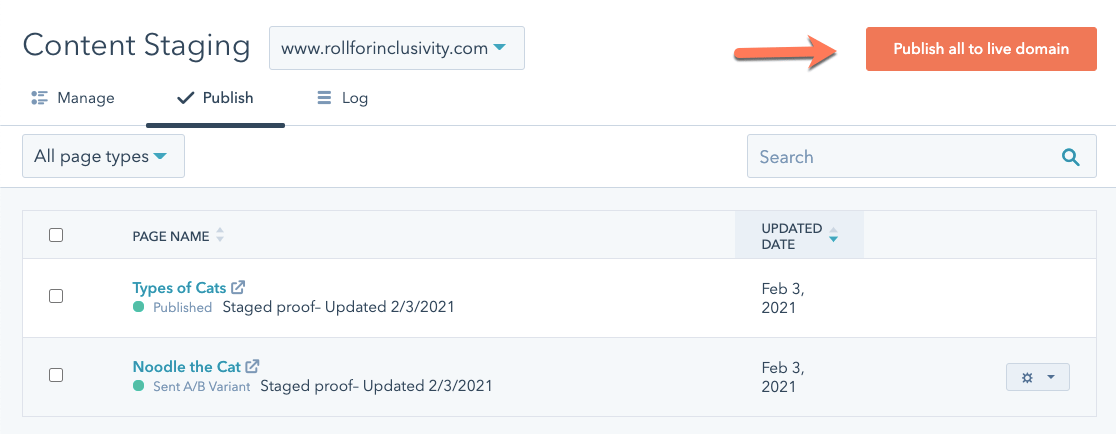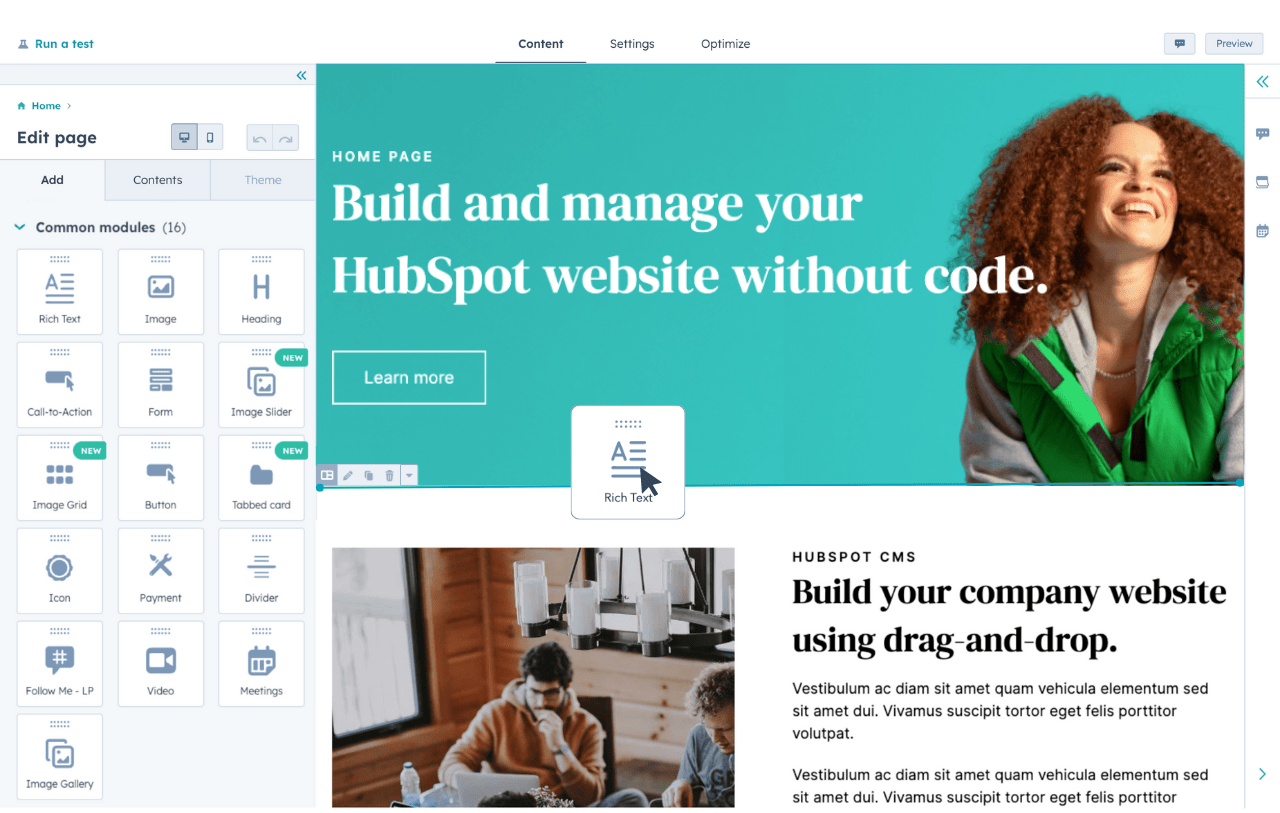Whether building your own website on HubSpot, or working with a HubSpot partner, you'll eventually need to start editing and populating pages with content using all the features available to you in the CMS.
Where to start can really depend on the size of the team you need to up-skill and the responsibilities of their individual roles, but we've collated what we think are the fundamentals required and included the resources available to you for free.
Essential HubSpot CMS features your team needs to understand
Let's look at the key features your team needs to understand to manage your HubSpot website effectively.
Content staging
Content staging is a powerful feature that lets you redesign and relaunch your website in a staging environment without affecting your live site. Think of it as a safe space where you can make major changes to your website, test them thoroughly, and then push them live when ready. This is particularly useful for large-scale website updates or redesigns where you want to ensure everything works perfectly before going live.
CMS pages
CMS pages are the foundation of your HubSpot website. These pages can be developed in different ways, from fully custom-coded templates to drag-and-drop layouts. Most commonly, pages are built using a combination of structured sections and flexible modules, allowing team members of varying technical abilities to confidently create and update content. Once built, pages can be optimised for search engines, previewed across different devices, and published immediately or scheduled for future release.
Blog posts
HubSpot's blog posts integrate directly into the CMS, allowing you to create, manage, and optimise blog content within the same environment as your website. The platform includes features for SEO optimisation, author management, and content scheduling, making it ideal for teams managing regular content publication.
Forms
Forms are your primary tool for capturing visitor information and generating leads. HubSpot's form builder lets you create customisable forms that automatically sync with your CRM, making it easy to track and manage submissions.
CTAs (calls-to-action)
CTAs in HubSpot are sophisticated marketing tools that go beyond simple buttons or banners. The CTA tool wraps your conversion elements (like buttons, text links, or banners) in an analytical framework that tracks performance metrics whilst enabling centralised management. This means you can create a CTA once, deploy it across multiple pages, and manage all instances from a single location. Any updates automatically roll out everywhere the CTA appears. For teams using Professional Hub tiers, built-in A/B testing capabilities help optimise conversion rates across your website.

Global content
Global content allows you to create and manage elements that appear across multiple pages of your website, such as headers, footers, or navigation menus. This feature ensures consistency across your site and makes it easier to update common elements – when you make a change to global content, it automatically updates everywhere it appears.
Multi-language content
For organisations serving international audiences, HubSpot CMS supports creating and managing content in multiple languages. You can create language variations of your pages, manage translations, and implement language switchers to let visitors choose their preferred language.
HubDB
HubDB is a relational database built into HubSpot CMS that helps you manage and display dynamic content. It's particularly useful for creating resource libraries, team directories, product catalogues, or any content that follows a consistent structure and needs regular updates.
Additional certifications and courses
When working with larger teams, you can take your expertise to the next level with HubSpot Academy. Here you'll find a selection of free, certified courses. If you are a HubSpot customer, you will unlock further courses.
As a starting point, we recommend your team complete the 'HubSpot Content Hub for Marketers' certification as a minimum. In addition to what you have learnt from the HubSpot Knowledge Base, this pathway will provide in-depth video guides of the tooling and how to apply it.
Using Sandbox accounts for training
Training your team on a live website can be risky. That's where sandbox accounts come in. A sandbox account is a separate environment where your team can practise and experiment without affecting your live website.
If you're a HubSpot customer, you won't want your staff practising their skills on your real account. You can create CMS Developer Sandbox accounts to safely try things out, or depending on your subscription level, you can replicate your existing configuration in a standard sandbox account.
When to engage HubSpot CMS specialists
Whilst HubSpot CMS is designed to be user-friendly, there are certain scenarios where engaging a specialist HubSpot web developer can save time and prevent costly mistakes:
Global styling changes
Making changes to your website's global styling requires a deep understanding of both design principles and HubSpot's development framework. Specialist HubSpot developers can ensure changes are implemented correctly and consistently across your site.
New modules
Custom modules often require specialised development knowledge. HubSpot web developers can create modules that perfectly match your needs whilst maintaining performance and security standards.
Custom solutions using HubDB
Whilst HubDB is powerful, complex implementations might require expert help. Specialist HubSpot web developers can help you design and implement custom solutions that make the most of HubDB's capabilities.
Additional features in HubSpot Content Hub
Whilst this guide focuses on getting your team familiar with the CMS fundamentals, it's worth noting that HubSpot Content Hub includes additional features that can enhance your content creation and management capabilities, such as:
- Brand Voice: AI-powered content editing that maintains your brand's tone
- Content Remix: Tools for repurposing content across different formats
- AI Blog Generator: Assistance with creating search-optimised blog content
- Podcasts: Built-in podcast hosting and distribution
Next steps for training your team
Getting your team ready to use HubSpot CMS effectively requires a balanced approach:
- Start with the fundamentals outlined in this guide
- Ensure team members complete the recommended certifications
- Use sandbox accounts for hands-on practice
- Engage specialists for complex technical requirements
Remember that learning HubSpot CMS is an ongoing process. As your team becomes more comfortable with the basics, you can gradually introduce more advanced features and capabilities.












